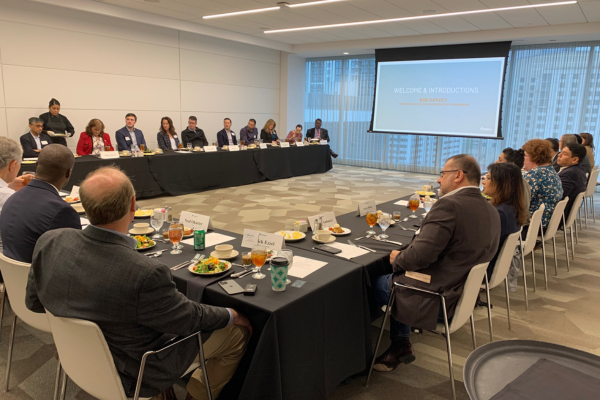Houston A Growing Hub for Biotech
Published Apr 06, 2023 by Taylor Tatum
The industrial biotechnology industry is one of the most promising new approaches to pollution prevention, resource conservation and cost reduction. With the industry expected to grow into a $4 trillion to $30 trillion sector, the Houston region is positioning itself as a leading synthetic bio industrial hub.
Houston is already home to a growing number of biotech startups and established firms who are relocating or expanding operations in the region.
rBIO, a biotech startup based out of San Diego, has relocated to Houston to take advantage of the exciting developments happening within its life science ecosystem. Founder Cameron Owen says that Houston was not originally on his radar, citing San Diego and Boston as being the two major biotech and life science hubs, but after visiting the city in December 2021, he was impressed by what he witnessed. “Companies from California like us and the coastal areas were converging here in Houston and creating this new type of bioeconomy,” Owen said in an interview with Innovation Map. “When we look to want to get into manufacturing, we definitely want to build something here in Houston.” rBIO is currently coming out of its R&D stage and transitioning into clinical trials, with a third to come this April. The company is making plans to fundraise and meet with potential partners to scale up and build out a facility in the future.
PackGene is another biotech company making moves in the Greater Houston area. Last month, the company broke ground on a 25,000-square-foot facility, located southwest of the 610 Loop. The building will house processing and analytical lab space, designated space for quality control, a warehouse, and office space. PackGene has plans to triple its Houston workforce to 60 by the end of 2023 upon the building’s completion. In a statement to the Houston Business Journal, PackGene’s chief technology officer LiYing Yang said, “We are excited to bring economical, reliable and scalable AAV products, as well as our viral vector development and (good manufacturing practices) production capabilities, to our next full-service operations center in Houston... These capabilities will enable us to serve our U.S. customers better and, importantly, to help bring life-saving therapies to patients faster, more reliably, and more cost-effectively.”
In February, Swiss biotech company Lonza completed its 15,000-square-foot laboratory expansion as part of ongoing efforts to develop and scale its gene and cell therapy customer base.
As part of a growing effort to cement Houston as a leading life sciences, tech and innovation hub, the Partnership recently hosted some of Houston’s brightest minds at its first Bio Industrial Luncheon. Business leaders and industry experts came together to discuss the importance of Houston’s biotech industry and how partners and stakeholders across various industries and disciplines can get involved.
First Bight Ventures has recently launched the BioWell, a public-private partnership that will provide resources and support to biomanufacturing innovators. According to a company statement, the BioWell will “provide a holistic, curated support for startups" to bridge the gap between R&D and commercialization. The goal is to create a thriving ecosystem for biomanufacturing and biotech startups made up of people across corporations, foundations, investors, and academic institutions. The importance of creating the infrastructure and support system necessary for making this vision a reality was highlighted by international consultant Dan Holladay. “Success will depend on comprehensive industry-wide collaboration,” he said.
First Bight is being joined in its efforts by BASF, the corporate venture capital arm of the BASF Group – a chemical manufacturing company - and the East End Maker Hub, an innovation hub and incubator in Houston.
Learn more about Houston’s life science ecosystem.
 The Houston Report
The Houston Report



















